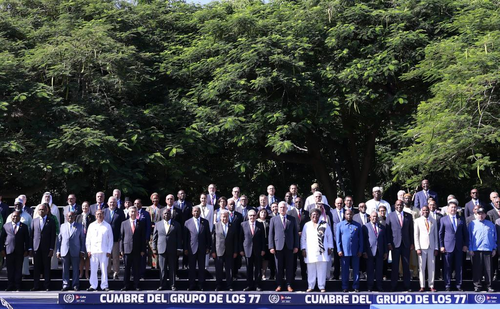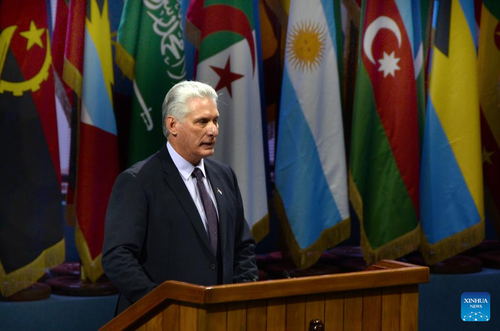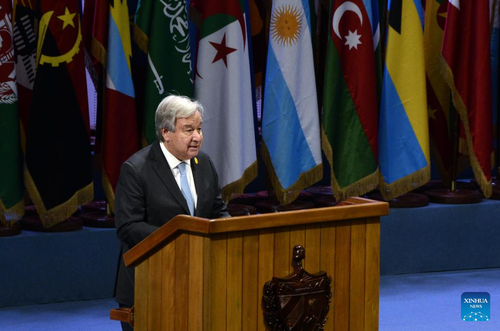 Delegates attend the G77 plus China Summit in Havana, Cuba. (photo: Ding Haitao/Xinhua) Delegates attend the G77 plus China Summit in Havana, Cuba. (photo: Ding Haitao/Xinhua) |
After two days of meetings on September 15 and 16 in Havana, G77 members issued a Final Declaration of 46 points, calling on the international community, the United Nations, and international financial institutions to support the Global South countries in developing and strengthening science, technology, and innovation. The Declaration reflects the view of many G77 leaders that the world needs a new, more equitable economic and social order.
Narrowing differences and inequality in science-technology
Themed "Current development challenges: the role of science, technology, and innovation," the Summit discussed ways to turn science, technology, and innovation cooperation into national development strategies.
The G77 countries called for narrowing the development gap between the G77 countries and developed countries, and eliminating discrimination in accessing the world's scientific and technological achievements.
 Miguel Diaz-Canel, the President of Cuba (Photo: Joaquin Hernandez/Xinhua) Miguel Diaz-Canel, the President of Cuba (Photo: Joaquin Hernandez/Xinhua) |
Miguel Diaz-Canel, the President of Cuba, the host country, said that UN statistics show that 10 countries account for 90% of patents and 70% of exports of advanced digital technologies.
He said the G77 should fight to remove injustice, because the goal of building a more equitable world will not be realized as long as a few developed economies dominate advanced technology and refuse to share:
“We have to fight for the right to develop, which is the right to survive. Until then we will not have equal status in the science and technology revolution,” said the Cuban President.
The Cuban President's view was supported by many G77 leaders. Brazilian President Lula da Silva said that when Brazil takes on the role of Chairman of the G20 in 2024, it will propose working groups on science, technology, and innovation to promote the interests of developing countries.
The Havana Declaration which was adopted at the end of the Summit says science, technology, and innovation are the driving force and stimulus for inclusive growth. G77 countries pledged to promote North-South cooperation in finance, South-South cooperation, trilateral models, and new cooperative mechanisms in science, technology, and innovation.
The Summit supported Cuba’s initiative to observe "Day of Science, Technology and Innovation in the South," annually on September 16.
Establishing a new fairer order
Besides promoting cooperation in science, technology, and innovation, G77 countries have voiced their concern about the current world situation and called for fundamental changes in global governance.
Argentinian President Alberto Fernandez said the COVID-19 pandemic marked a turning point and exposed inequality in vaccine access among countries. 90% of the vaccines were in the hands of about 10 countries.
Palestinian President Mahmoud Abbas and Colombian President Gustavo Petro criticized the double standard of many powers in dealing with major conflicts in the world and asked the United Nations to pay more attention to voices from the Global South.
 UN Secretary General Antonio Guterres (photo: Joaquin Hernandez/Xinhua) UN Secretary General Antonio Guterres (photo: Joaquin Hernandez/Xinhua) |
Their opinions received support from Secretary General Antonio Guterres, who said that over the past few decades, Global South countries have been caught up in, and were the biggest victims of, crises originating in developed countries. He praised efforts to improve their position in the international arena and urged the world to correct injustice.
“The world is facing myriad crises, with rising poverty and hunger, rocketing prices, soaring debt, and surging climate disasters. And natural disasters are happening more regularly. Global systems and frameworks have let you down. The conclusion is clear: the world is failing developing countries,” said Guterres.
Cuba said that President Miguel Diaz-Canel will convey the G77’s messages to the 78th session of the United Nations General Assembly in New York. Cuba said that as the rotating President of the G77, it will represent the group in protecting its the legitimate interests and demands, starting at the high-level dialogue on finance for development on Wednesday.
The G77 Summit issued a strong Declaration just a few days before the the UN high-level session which shows that the Global South countries are determined to have a more important role and an independent position in the global governance system. The frustration of G77 countries will put pressure on international political and financial institutions to better respond to global challenges.